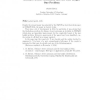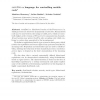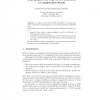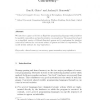110
click to vote
FOSSACS
2004
Springer
15 years 6 months ago
2004
Springer
The pi calculus holds the promise of compile-time checks for whether a given program will have the correct interactive behaviour. The theory behind such checks is called bisimulati...
FOSSACS
2004
Springer
15 years 6 months ago
2004
Springer
Abstract. Using a probabilistic polynomial-time process calculus designed for specifying security properties as observational equivalences, we develop a form of bisimulation that j...
91
Voted
FOSSACS
2004
Springer
15 years 6 months ago
2004
Springer
People often need to reason about policy changes before they are adopted. For example, suppose a website manager knows that users want to enter her site without going through the w...
105
Voted
FOSSACS
2004
Springer
15 years 6 months ago
2004
Springer
We describe a game semantics for local names in a functional setting. It is based on a category of dialogue games acted upon by the automorphism group of the natural numbers; this ...
103
click to vote
FOSSACS
2004
Springer
15 years 6 months ago
2004
Springer
We introduce adhesive categories, which are categories with structure ensuring that pushouts along monomorphisms are well-behaved. Many types of graphical structures used in comput...
60
Voted
FOSSACS
2004
Springer
15 years 6 months ago
2004
Springer
100
Voted
FOSSACS
2004
Springer
15 years 6 months ago
2004
Springer
safeDpi is a distributed version of the Picalculus, in which processes are located at dynamically created sites. Parametrised code may be sent between sites using so-called ports, ...
61
Voted
FOSSACS
2004
Springer
15 years 6 months ago
2004
Springer
Abstract. In order to study relative PCF-definability of boolean functions, we associate a hypergraph Hf to any boolean function f (following [3, 5]). We introduce the notion of t...
109
Voted
FOSSACS
2004
Springer
15 years 6 months ago
2004
Springer
We introduce a game model for an Algol-like programming language with primitives for parallel composition and synchronization on semaphores. The semantics is based on a simplifie...
78
Voted
FOSSACS
2004
Springer
15 years 6 months ago
2004
Springer





